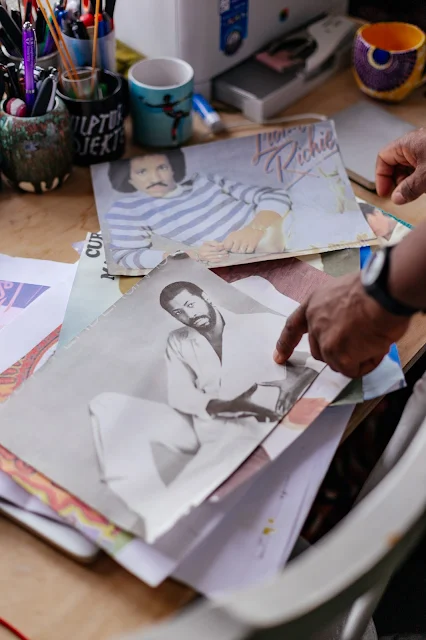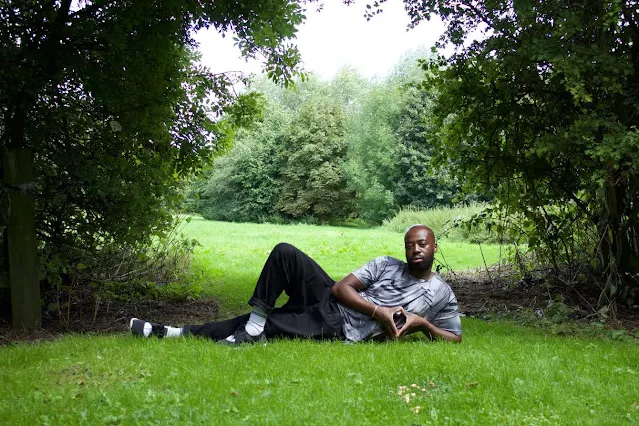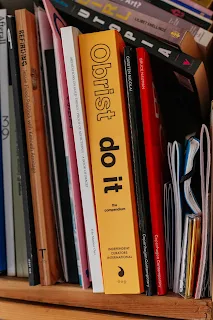Harold Offeh is an artist working in the spheres of performance, event, collaboration and participation. He lives in Cambridge and has recently collaborated with Kettle's Yard and members of the North Cambridge community as a resident artist for the Open House project. He also works as a reader in Fine Art at Leeds Beckett University. I first met Harold at an event I photographed for Kettle's Yard, towards the end of his Open House residency, and invited him to participate in my studio visit series.
Like many of the artists I've known in this area, Harold's studio is in fact a spare room in his house devoted to his art-making and research-gathering processes. In this room, he stores art books, collects inspirations and keeps records of the many projects he's worked on in his career so far. His desk sits by a window overlooking the garden of the house he shares with his partner in North Cambridge, close to the community he collaborated with as part of his Open House residency. Harold welcomed me in and made coffee for us both, and I took photographs as we chatted about some of the themes and ideas behind his work.
One of Harold's recent projects is an extension of one of his key works, his Covers project, for which he re-enacted classic album sleeve photographs of the 1970s and 80s. For this project, while on another residency at Cambridgeshire's Wysing Arts Centre, he made a series of self-portraits in a repose or lounging position. This pose is often associated with a particular era of popular culture and music history, and with studio photographs of black, male singers featured on album covers. By making these self-portraits in rural, outdoor environments, Harold explored and re-contextualised this particular kind of representation.
Harold showed me some of the album covers he'd found during his research which conformed to this photographic trope. There is clearly a sense of humour in the way Harold extracted a recurring motif and placed it in a different context, and in a different time. At the same time, I wondered if there was a kind of critical detachment in his reframing of the subject. I asked Harold to explain further:
"The series Lounging is an extension of an ongoing project called Covers. Covers has taken as its starting point depictions of black singers from the 1970s as presented on their album sleeves. I'm interested in how the album sleeve functions as a piece of design that serves to communicate and market an identity. Looking back historically, I'm interested in how these artefacts reflect debates and discussions about identity and self-representation. In my approach of re-staging the images I'm interested in how copying the original image might open up an experience of the history of the image. The comic element happens in the failure of my version to emulate the original image. I also want my version to direct people to the original."
'Lounging' © Harold Offeh
One recurring feature of artists' studios which always interests me is their collections of things. Unfinished projects, works by other artists, books, scrapbooks, sketchbooks, and all the things an artist has deemed worthy of possession. I asked Harold if he could show me any examples of items in his studio which had inspired him in some way. Harold reached for a brown paper package, which was stowed away between books on his shelves, and began to unwrap a carved brick, which apparently had not been opened since he first acquired it. The brick, it turned out, was produced by a Thai artist named Rirkrit Tiravanija. Harold picked one up at the Venice Biennale in 2015 for €10; the money, he told me, would go to Chinese workers.
We also talked about what it's like to live in Cambridge as a practising artist. Harold was born in Ghana, and grew up in London, and he originally moved to Cambridge three years ago to live with his partner, who works at the University. "My relationship to the city has very slowly evolved," he says. "Culturally Cambridge is quite a hard place to navigate. There is a lot going on but you have to access certain networks, to access the information and people." For Harold, "things shifted last year when I made a strategic effort to work with arts organisations in the city. This allowed me to meet and establish dialogues with some amazing people. It's much easier to do that in Cambridge than in London."
We also talked about the different layers of the Cambridge community. The obvious and clichéd distinction is between the 'town and gown' - the general public and those who are affiliated with the University. A third, perhaps more recently developed science and technology sector also exists, with big pharmaceutical and tech companies building their offices and research facilities on the outskirts of the town. The three co-exist and cross over at various points. The Open House programme run by Kettle's Yard is one example of an attempt to bridge the divide between Cambridge's more affluent and more economically deprived communities.
Harold's newest work is a performance piece for Kettle's Yard's latest exhibition: Actions. The image of the world can be different. His piece will take inspiration from documents found in the Kettle's Yard archive, in which Jim Ede had catalogued the objects kept around the house. "I came across Jim Ede's inventory while doing some research for the Open House residency. I really liked how the notes on the inventory told stories about the origins of the objects. Often these were anecdotes, but for me, it opened up some interesting conversations about the function of objects. The objects seemed to be vessels for memories and history. In the performance I'm doing I'm treating the list as an archive. I'll be animating the objects by presenting them and displaying them. In all of my work, I'm interested in how one might use the body as a research tool for exploring histories. It should be quite comic and perhaps chaotic."
Harold's performance will take place at Kettle's Yard on the 17th of March. For more information, and to book tickets, visit the event page on the Kettle's Yard website.
Thank you, Harold, for participating in this series!












Write a comment